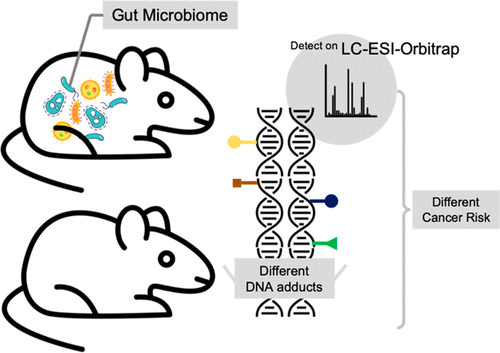当前位置:
X-MOL 学术
›
Chem. Res. Toxicol.
›
论文详情
Our official English website, www.x-mol.net, welcomes your
feedback! (Note: you will need to create a separate account there.)
Effects of Gut Microbiome on Carcinogenic DNA Damage.
Chemical Research in Toxicology ( IF 3.7 ) Pub Date : 2020-07-17 , DOI: 10.1021/acs.chemrestox.0c00142 Yun-Chung Hsiao 1 , Chih-Wei Liu 1 , Liang Chi 1 , Yifei Yang 1 , Kun Lu 1
Chemical Research in Toxicology ( IF 3.7 ) Pub Date : 2020-07-17 , DOI: 10.1021/acs.chemrestox.0c00142 Yun-Chung Hsiao 1 , Chih-Wei Liu 1 , Liang Chi 1 , Yifei Yang 1 , Kun Lu 1
Affiliation

|
The human intestine is host to a vast microbial community: the gut microbiome (GM). The GM has been considered as a key modulator of human health in the past decade. In particular, several studies have supported that altered GM is associated with cancer, such as colorectal cancer, adenocarcinoma, and pancreatic cancer. The formation of a DNA adduct is one of the key events in carcinogenesis, and whether GM can influence DNA adducts has yet to be examined. This study analyzed 10 DNA adducts (N2-Me-dG, N6-Me-dA, N2-Et-dG, OH-Me-dG, OH-Me-dA, N2-EtD-dG, O6-Me-dG, 1,N2-ε-dG, 8-oxo-dG, and 5-Cl-dC), attributed to various endogenous processes and physiological stressors, using highly sensitive LC–MS/MS in germ-free (GF) and conventionally raised (CONV-R) mice. Our results showed that significant differences in specific DNA adducts appeared in liver, colon, and small intestine samples between GF and CONV-R mice. The differences in adduct levels may indicate that GM can locally or systemically regulate endogenous processes including neutrophil bactericidal activity (represented by 5-Cl-dC), lipid peroxidation (1,N2-ε-dG), oxidative stress generation (8-oxo-dG), and endogenous aldehyde metabolism (OH-Me-dA). Further studies are warranted to elucidate how the GM influences endogenous process, DNA damage, and the risks of developing cancer.
中文翻译:

肠道微生物组对致癌 DNA 损伤的影响。
人类肠道拥有庞大的微生物群落:肠道微生物组 (GM)。在过去的十年中,转基因一直被认为是人类健康的关键调节剂。特别是,一些研究支持转基因与癌症相关,例如结直肠癌、腺癌和胰腺癌。DNA 加合物的形成是致癌作用的关键事件之一,转基因是否能影响 DNA 加合物还有待研究。本研究分析了 10 种 DNA 加合物(N 2 -Me-dG、N 6 -Me-dA、N 2 -Et-dG、OH-Me-dG、OH-Me-dA、N 2 -EtD-dG、O 6 - Me-dG, 1,N 2-ε-dG、8-oxo-dG 和 5-Cl-dC),归因于各种内源性过程和生理压力,在无菌 (GF) 和常规培养 (CONV-R) 中使用高灵敏度 LC-MS/MS ) 老鼠。我们的结果表明,特定 DNA 加合物在 GF 和 CONV-R 小鼠的肝脏、结肠和小肠样本中出现了显着差异。加合物水平的差异可能表明 GM 可以局部或系统地调节内源性过程,包括中性粒细胞杀菌活性(以 5-Cl-dC 表示)、脂质过氧化(1,N 2 -ε-dG)、氧化应激生成(8-oxo -dG) 和内源性醛代谢 (OH-Me-dA)。需要进一步的研究来阐明转基因如何影响内源性过程、DNA 损伤和患癌症的风险。
更新日期:2020-08-17
中文翻译:

肠道微生物组对致癌 DNA 损伤的影响。
人类肠道拥有庞大的微生物群落:肠道微生物组 (GM)。在过去的十年中,转基因一直被认为是人类健康的关键调节剂。特别是,一些研究支持转基因与癌症相关,例如结直肠癌、腺癌和胰腺癌。DNA 加合物的形成是致癌作用的关键事件之一,转基因是否能影响 DNA 加合物还有待研究。本研究分析了 10 种 DNA 加合物(N 2 -Me-dG、N 6 -Me-dA、N 2 -Et-dG、OH-Me-dG、OH-Me-dA、N 2 -EtD-dG、O 6 - Me-dG, 1,N 2-ε-dG、8-oxo-dG 和 5-Cl-dC),归因于各种内源性过程和生理压力,在无菌 (GF) 和常规培养 (CONV-R) 中使用高灵敏度 LC-MS/MS ) 老鼠。我们的结果表明,特定 DNA 加合物在 GF 和 CONV-R 小鼠的肝脏、结肠和小肠样本中出现了显着差异。加合物水平的差异可能表明 GM 可以局部或系统地调节内源性过程,包括中性粒细胞杀菌活性(以 5-Cl-dC 表示)、脂质过氧化(1,N 2 -ε-dG)、氧化应激生成(8-oxo -dG) 和内源性醛代谢 (OH-Me-dA)。需要进一步的研究来阐明转基因如何影响内源性过程、DNA 损伤和患癌症的风险。











































 京公网安备 11010802027423号
京公网安备 11010802027423号